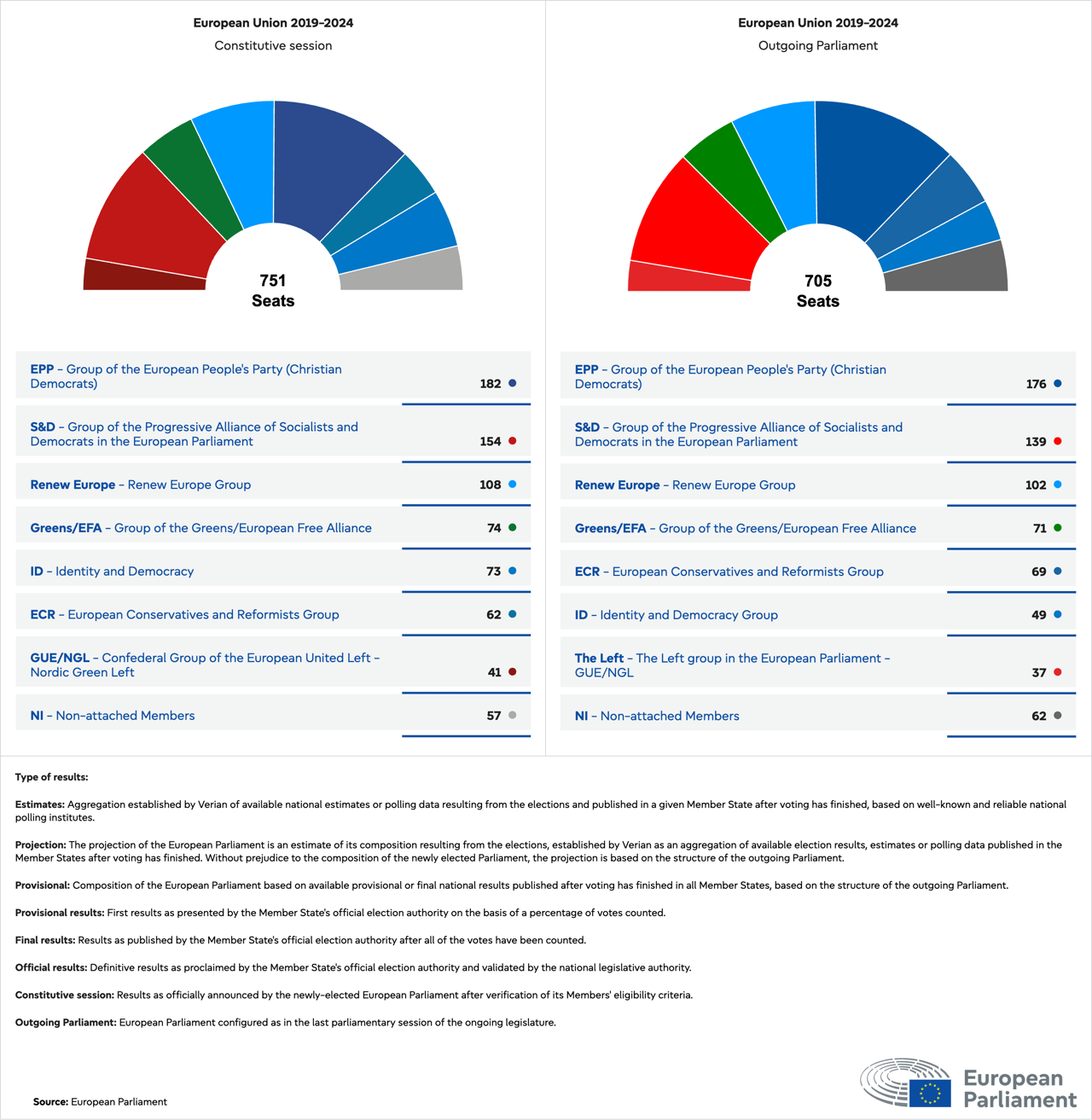More than 360 million Europeans were eligible to vote in this ongoing EU elections — a four-day democratic marathon across the 27 EU member states whose outcome will determine the influence of political forces in Europe over the next five years.
While European elections often see a low turnout (with the highest-recorded at just 51 percent in 2019), this time they have received increased focus, especially due to the major challenges the EU has faced since that last vote — mainly the Covid-19 pandemic and the war in Ukraine.)
Unlike previous EU elections, but mirroring national outcomes, the 2024 elections have the potential to shift the traditional power balance from progressive forces to those on the right — and either increase fragmentation of party groupings within the next European Parliament, or see some sort of consolidation of national conservatives plus populist far-right forces.
While we are still awaiting final results from EU member states (namely Italy, where the last voting polls close at 23:00), follow our live coverage below:
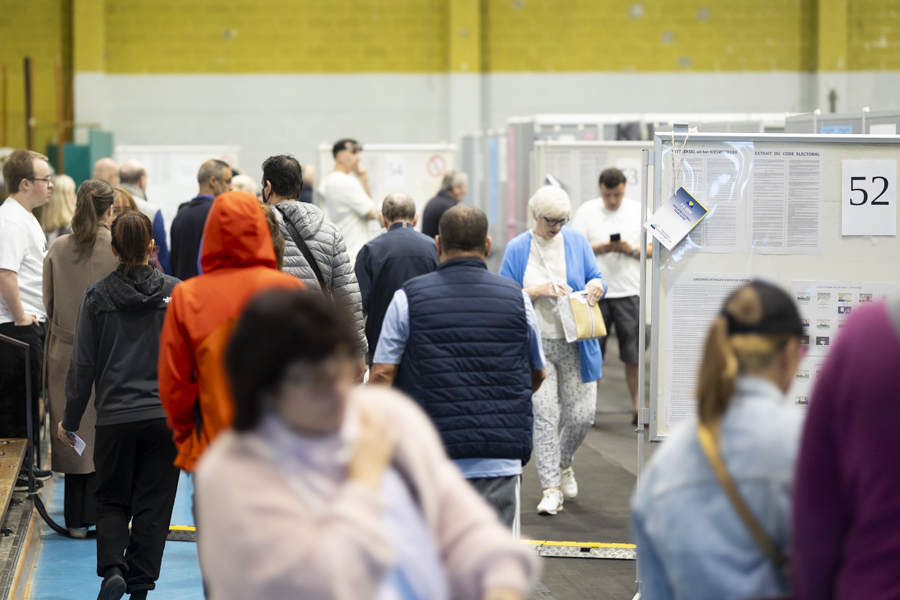
And that's a wrap
Thanks for joining us, and read our final wrap up here.
EU politics 'less intelligible' than ever before (0:38)
"EU politics appears not only more fragmented, but also less intelligible than ever before," said Alberto Alemanno, professor of EU Law at HEC Paris and College of Europe, on X.
The post-election period, he said, will be shaped and driven by both internal matters (such as the snap French elections and the formation of the Dutch government) and external ones (such as the war in Ukraine, and the upcoming US presidential elections, among others).
EU political groups will start reshuffling to divide EU money and top jobs. And unaffiliated MEPs may play a role in shaping the new political cycle, Alemanno also said.
Socialists and Greens pitch a democratic majority, Renew absent (0:27)
The Socialists & Democrats lead candidate Nicolas Schmit said they are open to collaborating with the European People’s Party (EPP).
“It is clear that for us. We are open to strong cooperation with all democratic forces in this parliament,” he said, after congratulating the EPP and the EPP lead candidate Ursula von der Leyen for winning the elections.
“We are open to all democratic forces, as we are closed to all those who want to dismantle Europe,” he also said.
“I'm confident that we are able together to find a way how we can govern Europe in a difficult time,” he also said.
While acknowledging losses and gains in different countries across Europe, the Greens also called for a "stable majority" and pledged to act responsibly to deliver for Europeans.
Green lead candidate Bas Eickhout said that the elections clearly show that the lead candidate for the EPP has won the election and this should be reflected in the outcome of the council taking place later this month.
"We are disappointed about the results, which are mainly because of losses in Germany and France," he said, pointing to Green wins elsewhere.
"We are clearly not happy with the total number of seats," Eickhout said, adding that he was happy with the broader representation of greens throughout Europe.
The Dutch politician also argued that the "challenges facing Europe were too big to play political games", arguing for the need for a "stable majority" and pitching the Greens as a coalition partner.
"The Greens are ready to deliver. We are ready to take that responsibility," Eickhout also said, while calling for the "continuation of the Green Deal as a part of a green industrial strategy. "I think the biggest mistake we would do is now to abandon the Green Deal."
Notably, Renew liberal Valérie Hayer was absent from the EP gathering of lead candidates late Sunday night.
Five more years of Ursula? (00:21)
The first lead candidate to speak on Sunday night was incumbent commission president Ursula von der Leyen, from the European People's Party (EPP).
"Today is a good day for the EPP," von der Leyen said, celebrating their election win and arguing that the result had two messages.
"First, there remains a majority in the centre for a strong Europe," von der Leyen noted, but she added that it was "also true that the extremes on left and the right have gained support."
She also echoed Weber's comment on building on a "platform" with social democrats and liberals, in what she called a "proven and constructive relationship".
When questioned on possibly including the Greens in this platform, von der Leyen said that other partners would be a later consideration: "First things first."
On her bid for the commission presidency, she said she was "confident" of securing a second mandate.
The Greens are projected to be sidelined in the European Parliament amid a thrashing in Germany and France.
Climate change more difficult to sell (00:10)
Leapfrogged by both the far-right Identity and Democracy Group as well as European Conservatives and Reformists Groups, the Greens have seen their numbers drop from 71 MEPs to 53.
It is a stunning defeat on the back of a 2019 election win that saw the narrative to tackle climate change take root.
But Belgian Philippe Lamberts, who co-helmed the Greens since 2014, told EUobserver that the calculus on climate had changed.
“The popular mobilisation for climate at least in northern and Western Europe was not apparent this time,” he said. He also said the wider public has also evolved since 2019, making efforts to curb climate change a more difficult sell.
“Of course, the loss of seats is always a blow, also for us, but at the same time, we do see gains in other countries as well,” Bas Eikhout, a Dutch Green MEP, told reporters in Brussels.
'Respect the outcome of elections': EPP's Manfred Weber (23:18)
Manfred Weber, leader of the European People's Party (EPP), was triumphant. "We won the elections," Weber said, adding that among the "democratic centre parties" the EPP was the only one to win seats.
Praising Ursula von der Leyen for being a "convincing lead-candidate", Weber called on the other parties to support her candidacy for the commission presidency.
"Those who speak about saving democracy should respect the outcome of elections," Weber said, calling on German chancellor Olaf Scholz and French president Emmanuel Macron to endorse von der Leyen as commission president.
Weber invited Europe's social democrats and liberals to join the EPP's "pro-European and pro-democratic alliance," but would not immediately include the Greens, saying that "the starting point is the platform of social democrats and liberals."
Weber also said that "all those who want to destroy our Europe are our enemies," and vowing that the EPP would not allow them "any kind of influence at the EU level," but refused to specify who these enemies were, amid speculation over possible collaboration between the EPP and the rightwing ECR.
Responding to the possibility of Hungarian MEP candidate Peter Magyar's Respect and Freedom joining the EPP, Weber noted that many others wanted to join the party as well. "That's great news for us, we are attractive," Weber concluded, adding that "the door is open for all those who respect our goals."
Socialist call for a 'pro-European democratic coalition' (22:42)
Portuguese MEP Pedro Marques, the vice-chair of the Socialists and Democrats (S&D), called for a pro-democratic coalition for the next mandate.
“We can build the pro-European democratic majority, a pro-rule of law majority, and that's what we'll be fighting for in the weeks and months to come,” he said.
While congratulating the European People’s Party (EPP) and its lead candidate Ursula von der Leyen, Marques urged the EPP to avoid collaborating with European Conservatives and Reformists (ECR).
“If we need to extend this position, it should be in the direction of the progressive groups of the pro-European groups, and certainly not the direction of the far-right,” he said.
If needed, the Greens should be called to the negotiating table, he said.
The EPP, S&D and liberal Renew Europe should have around 398 seats, according to exit polls. This would represent 55.2 percent of total votes, down from 59.1 percent share in 2019. Bringing the Greens into this pro-democratic coalition would increase the numbers to 451 seats, representing 62.6 percent of total votes.
Wether this coalition could hold throughout the next five-year mandate is unlikely. On certain legislative proposals such as, for example, the controversial Nature Restoration Law, the S&D and Renew joined forces with the Greens and The Left to pass legislation. But this vote also saw the re-alignment of EPP with national conservatives ECR and far-right Identity and Democracy (ID), raising doubts about future green EU legislation.
Greens urge expansion of Green Deal, despite 'disappointing results' (22:37)
Outgoing Green co-leader Philippe Lamberts was disappointed by election results that have seen the climate-fighting party witness losses.
“Tonight’s result is certainly not a victory for the Greens,” he said. But Lamberts maintained that the future of the planet needs an expanded Green Deal.
He also called on the conservatives, the social democrats and liberals not to embrace “various flavours of the far-right.”
“Despite all the disappointing results tonight, we the Greens, the European Free Alliance stand ready to take up our responsibilities,” he said.
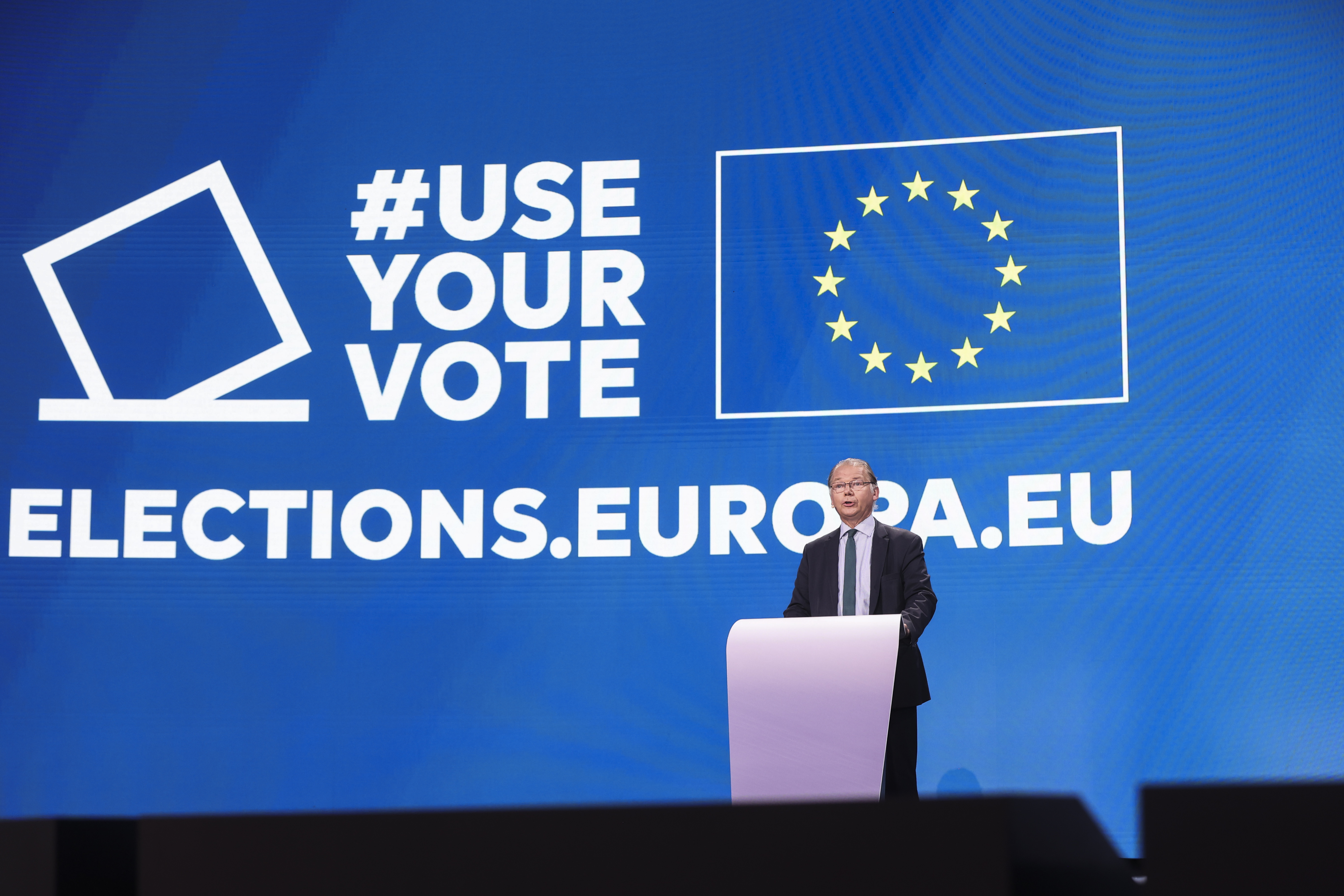
Far-right parties underperforming in the Nordics (22:36)
Left-leaning parties including the Greens are making gains in Denmark and Sweden, amid losses elsewhere in the European Union.
A remarkable outcome in Denmark has seen the Greens (Socialistisk Folkeparti) take poll position with 18.4 percent, followed by the socialists and liberal conservatives, according to exit polls.
"I can’t even describe how proud I am,” said Pia Olsen Dyhr, who chairs the party. Her party had earlier released a statement calling for an alternative response to both welfare and the climate. “We are willing to deliver that in the European Parliament,” it said.
Other results are coming in from Sweden, where the greens are now polling as the third largest with 15.7 percent, up 4.2 percent when compared to 2019.
Meanwhile, their nationalist and far-right counterparts Sweden Democrats dipped to 13.9 percent, down 1.4 percent from 2019.
Cas Mudde, a Dutch politics professor, on X said that far-right parties seem to be underperforming in the Nordic countries.
Weber urges parties to support von der Leyen (22:20)
Manfred Weber, leader of the European People's Party, has called on democratic parties in the European Parliament to respect the election result.
"The EPP lead candidate Ursula von der Leyen must now be supported by them as Commission president for the next five years," he said on X.
ECR silent on Fidesz, eyes collaboration with the centre-right EPP (22:17)
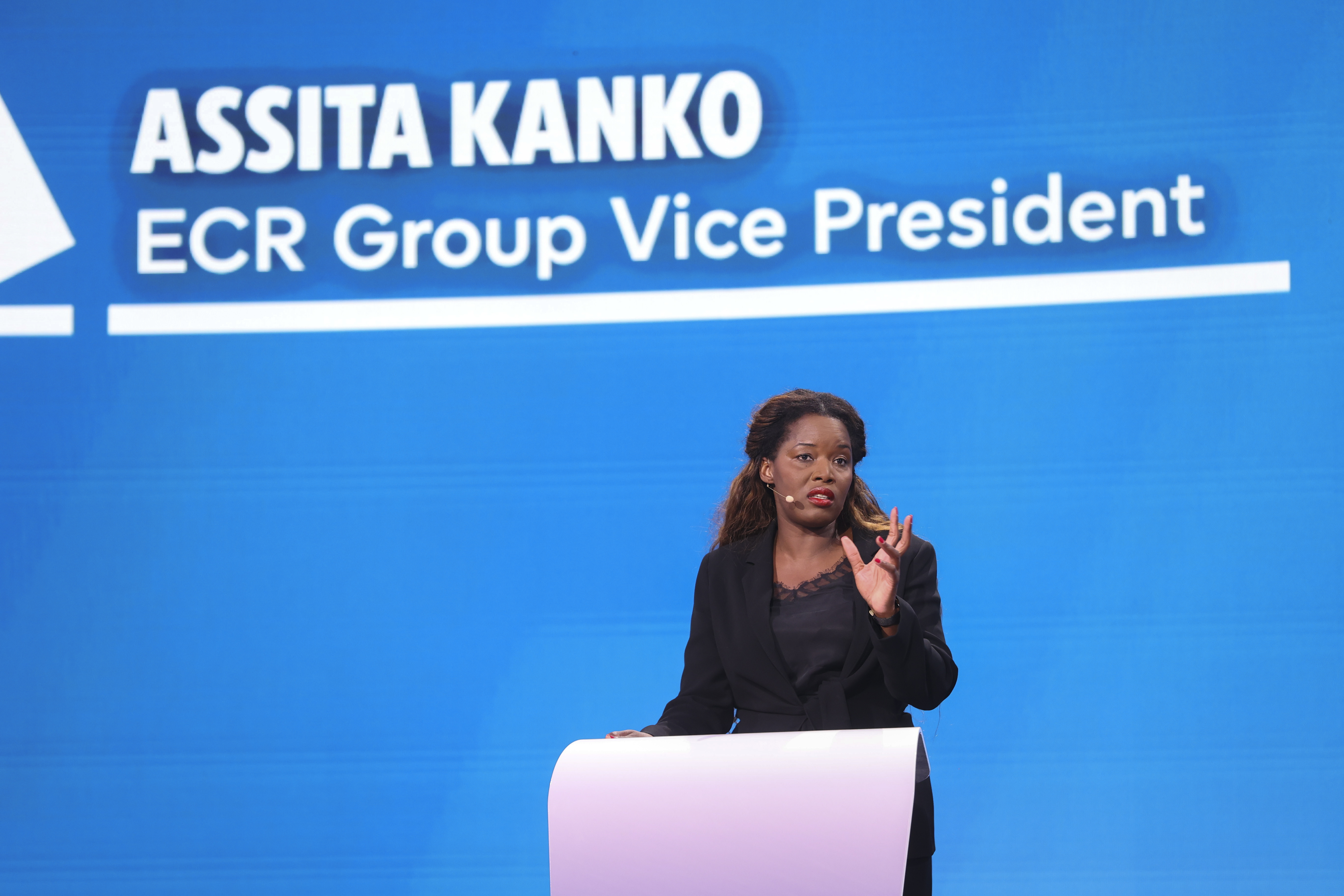
Assita Kanko, also a Belgian MEP, spoke on behalf of the European Conservatives and Reformists (ECR). “When the true aspirations of citizens are ignored, when nobody wants to acknowledge them, that gives more space to extreme movements,” Kanko said, emphasising the importance of "centre-right policy" on questions of defence, security and migration.
Pitching a possible collaboration with the European People's Party, Kanko expressed the hope that they "will be part of a majority in this parliament."
"We worked very well in the past five years, including with [EPP commission president] Von der Leyen" Kanko continued, adding that there was "nothing to prevent us from working with the EPP."
Kanko wouldn't comment on whether the ECR would welcome Viktor Orbán's Fidesz to boost the group's numbers. “In my view, the first priority is not to become the biggest, but is to see how we can work as we are now, taking the election results into account,” she said.
The Left reacts to exit polls (22:06)
Marc Botenga, a Belgian MEP for the Left, welcomed the advances made by the Left in several countries but expressed his concern about the gains of the far-right as well.
Blaming the policies of "traditional parties," Botenga argued that people's frustration over deteriorating public services and infrastructure drove them to the far-right, lamenting the "politics that have created a social disaster everywhere in Europe.”
Poland's PiS loses support, as EPP's Tusk secures slight majority (21:54)
The party of Polish prime minister and former European Council president Donald Tusk’s Civic Coalition has secured about 38 percent support, according to exit polls.
Tusk’s Civic Coalition is expected to have 19 MEPs in the next European Parliament — the same number secured by the Law and Justice (PiS) party — a party known for dismantling the rule of law in the country during its past administration.
PiS, one of the largest parties in the rightwing European Conservatives and Reformists, has seen its support drop from 45 percent in 2019 to 34 percent in 2024, losing a projected seven seats.
Meanwhile, the liberal Third Way are expected to get three seats and the socialist party two MEPs.
Newcomers from Poland include six projected MEPs from the far-right Confederation [Konfederacja] which still has to join a political family for the next mandate.
Macron drops bombshell — snap parliamentary elections later this month (21:53)
French president Emmanuel Macron dropped a bombshell in response to his party's painful defeat in the European elections, dissolving France's National Parliament and calling snap parliamentary elections.
"France needs a clear majority in serenity and harmony," Macron said, adding that the French had to "write history, not be driven it." The first round will take place on 30 June, followed by a second on 7 July.
Big gains for far-right Vox in Spain, but EPP remains favoured option for Spaniards (21:28)
Mirroring results from the most-recent Spanish national elections held last summer, the leading opposition party, the centre-right People's Party, has won Spain's European elections, securing 22 of the 61 seats allocated to the country, according to first exit polls.
Far-right Vox (a member of the European Conservatives and Reformists) has seen a sharp increase in support, climbing from six to 10 percent — more than doubling the number of MEPs, from three in 2019 to seven in the next legislative term.
The socialist party of prime minister Pedro Sánchez has seen a slight drop in support, from 33 to 30 percent, but it will maintain its 20 MEPs. Sánchez's allies, which sit in the Green group, have increased the number of MEPs from two to four.
But the biggest loser of this election is Ciudadanos, the liberal party that started in Catalonia in 2016 and disappeared in 2023. The liberal party saw their support drop from 12 percent in 2019 to one percent, and as a result, it will also disappear from the European Parliament.
Catalan pro-independence parties, divided into the Greens and the Left, have secured three MEPs.
And two MEPs are expected to come from the ‘Se Acabó la Fiesta’ [The Party's Over] party, whose leader, a far-right agitator, has become famous through social networks such as Telegram, Instagram, and YouTube.
Far-right triumphs in France (21:02)
French far-right leader Jordan Bardella has called for a new orientation of the European Union, following a historic win by Marine Le Pen’s National Rally (RN), which is projected to win 30 of France’s 81 seats —up 12 from its result in 2019.
“The French have tonight demanded to take back charge of the politics of migration, the return of state authority to each square metre of territory,” said the 28-year-old Jordan Bardella, president of the National Rally.
French president Emmanuel Macron’s Renaissance coalition came in second with 15.2 percent, followed by the socialists at 14.3 percent.
French president Emmanuel Macron’s liberal Renew coalition came in at less than half of that number with 14 seats, a humiliating loss of nine seats. Macron’s coalition was nearly overtaken by the Social Democrats led by Raphael Glucksmann, rising from seven to 13 MEPs.
The hard-left “France Unbowed” of The Left leader Manon Aubry slightly improved its performance, winning eight seats, compared to seven in 2019. And centre-right Republicans lost two of their eight previous seats.
Meanwhile, Eric Zemmour’s Reconquest Party (a member of Identity and Democracy) will exacerbate worries over France's far-right turn, newly-entering parliament with five seats. Once again, some of the heaviest losses are suffered by the Greens, losing more than half their seats as they dropped from 12 to five MEPs.
The latest election gain in France comes with far-right gains in Germany and in Austria.
Germany’s Alternative for Germany (AfD) obtained some 16.2 percent, behind CDU/CSU that came out on top with 30 percent, according to exit polls.
AfD’s leadership have described it as a “super outcome”. Their win comes despite Nazi-related scandals over its leading candidate Maximilian Krah.
“All in all people are fed up with the fact that they are faced with so much bureaucracy from Brussels,” Alice Weidel, AfD’s co-leader told broadcaster ARD.
Similar gains are being made by the far-right Freedom Party of Austria (FPO), whose first leader in 1956 was a former Nazi and SS officer.
The FPO is now in top position in Austria with 27 percent support, according to exit polls, followed by Austrian People’s Party (ÖVP).
The latest estimates suggest the far-right Identity and Democracy group could have 62 MEPs, up from the current 49.
First full hemicycle projection (based on national preliminary results) (20:35)
The European People’s Party (EPP) is projected to win this election, securing 181 MEPs, up from 176 in 2019, according to the first full hemicycle projection based on national preliminary results. The Socialists and Democrats (S&D) are set to lose four seats, reducing their number of MEPs from 139 to 135.
Due to a so-called 'greenlash' led by farmers’ protests against Europe’s environmental agenda, the Greens are poised to suffer one of the biggest hits, losing 18 seats from their current 71. Similarly, liberal Renew Europe is facing significant losses, with their number of MEPs dropping from 102 to 82.
Support for the European Conservatives and Reformists (ECR) has slightly grown, with projections indicating that they would win two more MEPs, totalling 71 in the next European Parliament and becoming the fourth largest group.
Meanwhile, the far-right Identity and Democracy (ID) has made sharp gains, increasing their number of seats from 49 to 62.
Please note that these are only preliminary results and that political groups are expected to reshuffle.
"Europeans are also still voting, so this is really just a first projection," warned European Parliament president Roberta Metsola (EPP).
Parties like Alternative for Germany (AfD) and Hungarian prime minister Viktor Orbán's Fidesz are currently in the group of Non-attached Members, but they are expected to join a political family to increase their influence in legislative processes.
Croatia results (20:31)
In Croatia, the Croatian Democratic Union, of current prime minister Andrej Plenković is projected to come first, winning half of Croatia’s total of 12 seats, adding two to their previous four MEPs.
Croatia’s Social Democratic coalition comes in second with four seats — gaining one, compared to 2019.
Green member “We can!” and the far-right Homeland Movement (a member of Plenković’s government coalition) will both enter the European Parliament for the first time, with one seat.
Green Spitzenkandidat Bas Eickhout speaks (20:24)
Reacting to the German result, Green lead candidate Bas Eickhout attempted to qualify his party’s losses, arguing it was “more of a vote against the Ampfel [traffic-light] coalition [of socialists, liberals and greens in Berlin]” rather than a rebuke of the Green Deal.
Emphasising gains made in the Baltic states, Eickhout argued that Greens “had a record high result in 2019”, which they knew “we would never be capable of repeating”.
The Green chief dismissed the suggestion that their group would try to recruit new members to boost their numbers. “We are not suddenly changing our tactics now, with more, or less, seats,” Eickhout said, adding that “contents goes first.”
Eickhout also suggested that to effectively counter the far-right, Greens and Social Democrats had to collaborate more, following the Dutch example. “Progressives need to sit down to think, OK, what is our alternative and how credible can we make that alternative?,” he said.
But he refused to confirm his support for the re-election bid of Ursula von der Leyen, lead candidate for the commission presidency of the European People’s Party (EPP).
“That's too early to tell.’, Eickhout said. “Any coalition we’ll be part of will be based on pro-democracy and pro-Europe. And that's very clearly without ID and ECR.”
World largest newsroom for one night (20:23)
About 1,000 journalists from 90 countries are expected in the European Parliament to cover election night, turning the hemicycle into the largest newsroom in the world for one night.
The first projection of the full hemicycle, based on national preliminary results, will be published soon. After the preliminary results came out from Germany, all eyes are now on France, where far-right Marine Le Pen's party, National Rally (a member of Identity and Democracy), is leading the polls.
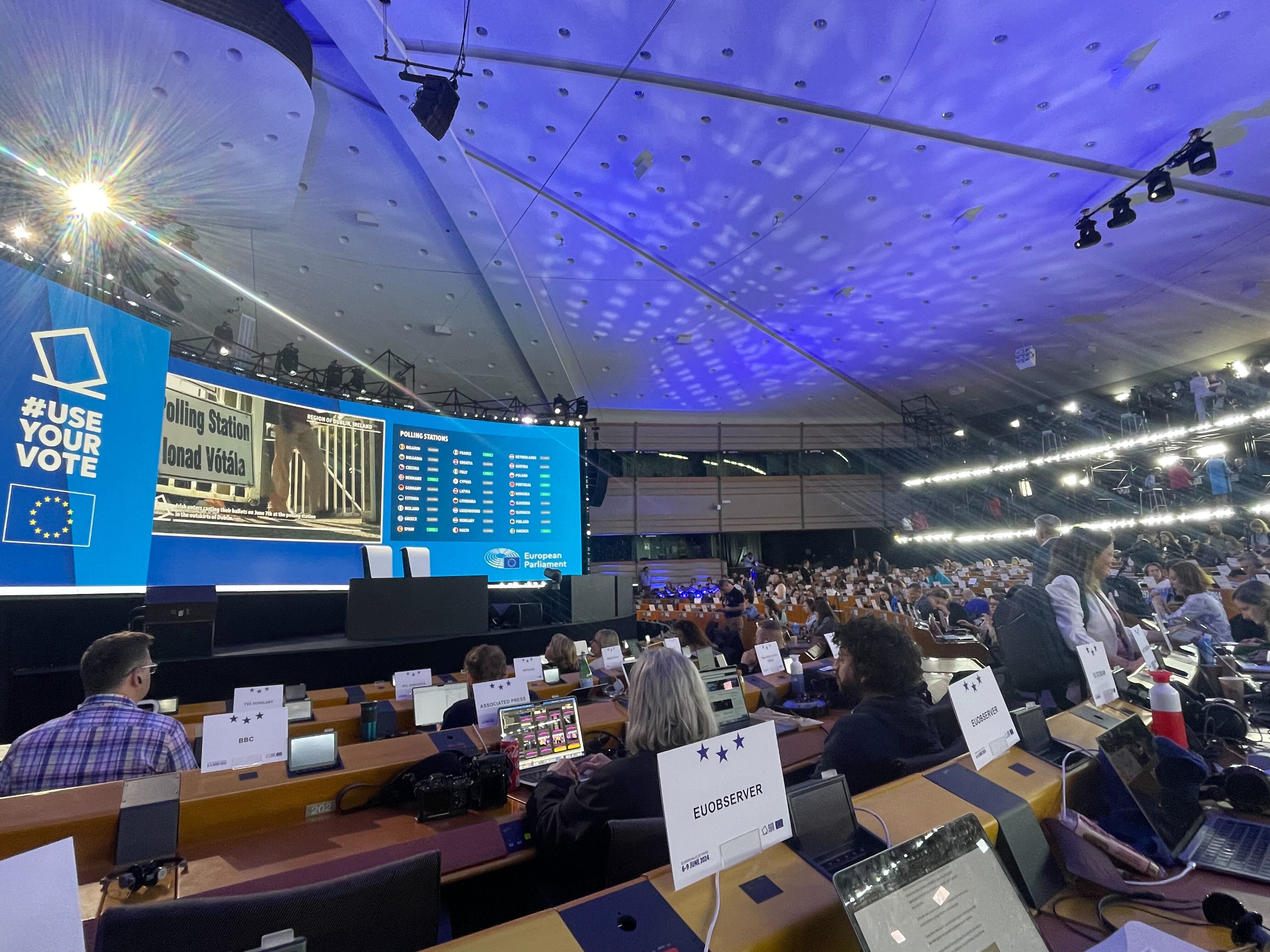
EUobserver’s coverage is free during the EP elections week
EUobserver is a non-profit news organisation reporting on EU. We are independent, meaning we don’t have a billionaire owner, a corporation backing us or moneymen in Dubai paying our salary. You do.
Your contributions have helped us uncover scandals, report on issues that matter (but don’t please advertisers) like labour policy and migration and hold power to account.
If you value our coverage, consider signing up for a supporting membership (starting from €1/month) or to our newsletter for three free articles per month.
Help keep our independent reporting independent.
NVA projected to come top in Belgian national election (19:45)
The Flemish nationalist party NVA (a member of the European Conservatives and Reformists — ECR), is expected to come top in Sunday's simultaneous Belgian national election, securing about 23 percent of support in the Belgian Chamber of Representatives — a seven-percent increase from the previous election in 2019, according to preliminary estimates.
The far-right Vlaams Belang (from Identity and Democracy) has also made significant gains in Belgium's northern region of Flanders, with their support increasing sharply over the years (from three percent in 2014 to around 12 percent in 2019 and 18 percent in 2024).
The current mayor of Antwerp, Bart de Wever (NVA), who hopes to become the next Belgian prime minister, previously ruled out any coalition with Vlaams Belang. He aims to lead a potential centre-right coalition with the Christian Democrats and the support of the liberals, which could be formed by September.
However, only 65 percent of the votes have been counted so far in Belgium — where voting is mandatory.
EPP's Weber slams German red/green/yellow coalition after first exit polls (19:13)
After the first exit polls were published in Germany, European People’s Party leader Manfred Weber celebrated the victory of his centre-right CDU/CSU which are expected to get 30 MEPs in the next European Parliament.
He also said that the so-called “traffic light” coalition in Berlin, with (yellow) Free Democrats (FDP) and Greens, under a (red) Social Democrat (SPD) chancellor Olaf Scholz, no longer reaches people.
“We stand for stability and are the bulwark against rightwing extremists like the [Alternative for Germany] AfD,” he said on X.
Far-right ID given room named after German green eco-feminist (19:00)
The far-right Identity and Democracy (ID) has been placed in a European Parliament room named after Petra Kelly, the late German green eco-feminist activist.
Kelly co-founded the Green party in Germany in 1979, which in this election has taken a thrashing, following its peak 2019 performance, against gains by the far-right Alternative for Germany, according to the latest exit polls.
Kelly, who died in 1992 at 44 years-old, focused much of her work on peace and non-violence, ecology, feminism and human rights.
Such efforts often run counter to the political goals of the ID group, which has railed against the European Commission’s green transition.
Incidentally, ID is also sharing the same floor with the Left, which has been placed in a room named after Manolis Glezos, a Greek leftwing politician.
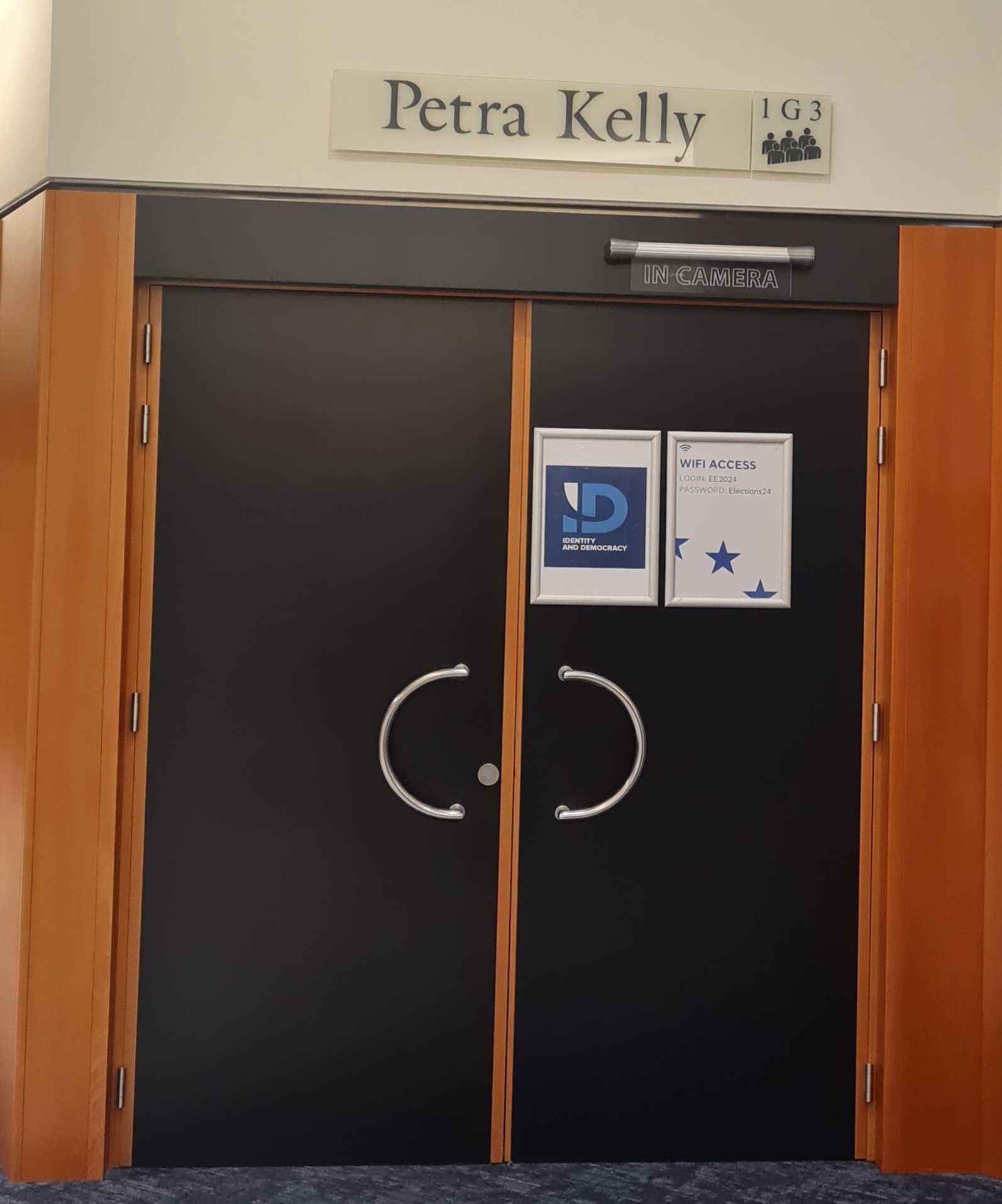
Greek PM Mitsotakis’s support confirmed (18:58)
Greek prime minister Kyriakos Mitsotakis's party New Democracy (European People’s Party) maintains solid support, securing eight of the 21 seats allocated for Greece, according to the latest national estimates. New Democracy had six seats in the outgoing parliament.
“In the next five years very important decisions will be made in Europe,” Mitsotakis said on X on Sunday.
The main leading opposition Syriza will maintain four MEPs, while the socialist party Pasok has seen an increase in support, getting three MEPs, a gain of one on the previous mandate.
Greek Solution, a member of the European Reformists and Conservatives, also won an extra seat on top of its previous one, with Greece's communist party remaining stable at two seats as well.
Greek newcomers to the parliament are far-right Niki and left-populist Course of Freedom, each winning one seat. Renew and the Greens will have no more Greek MEPs.
Far-right in Austria doubles its support (18:53)
Austria's far-right Freedom Party (FPO), part of the Identity and Democracy (ID) group, has gained about 27 percent of the vote, becoming the winner in Austria of the European Parliament elections, according to first national estimates. The FPO has doubled its number of MEPs from three to a projected six — of the 20 seats the country holds.
Chancellor Karl Nehammer's party, the Austrian People's Party (European People’s Party), is projected to have five MEPs, losing two seats compared to the 2019-2024 term.
The Social Democratic Party of Austria is set to maintain its five MEPs from the last European elections.
After a pre-election scandal involving 23-year-old Austrian Green EU lead candidate Lena Schilling, who has been accused of spreading hurtful rumours, the Green Party is projected to get two MEPs, down from three in the last mandate, after securing only about 10 percent of the votes.
NEOS, which is part of the liberal Renew Europe, saw a slight increase in support, climbing from eight to 12 percent. It is expected to secure two seats, gaining one more MEP.
Meanwhile, the biggest loser of the elections seems to be the party of Walter Baier, Spitzenkandidat (lead candidate) of the European Left for the European election, which got only three percent of the votes — and no representation in the next European Parliament.
AfD makes five-percent gain in Germany (18:30)
The first projection has arrived for Germany, the European Parliament’s largest delegation with 96 seats.
Despite allegations against the party's leading candidate, Maximilian Krah, the far-right Alternative for Germany (AfD) made sharp gains, climbing from 11 to 16 percent, and securing 19 MEPs — in a far-right surge that has started to take shape across Europe. The far-right Identity & Democracy group in the European Parliament expelled AFD after the pre-election scandals.
But Germany’s overall winner is commission president Ursula von der Leyen’s Christian Democratic Union (CDU), with the powerhouse of the European People’s Party slightly increasing its lead and securing 30 MEPs.
The other winner of the night is newcomer Sarah Wagenknecht, who's eponymous Sahra Wagenknecht Alliance (BSW) gained six percent of the vote, after splitting from her former party, the hard-left Die Linke (which got only three percent).
Meanwhile, the German Greens are the big losers, dropping to 12 percent from their record 21 percent in 2019, a result that does not bode well for their performance in the rest of Europe, considering their long-standing strength in Germany. Green lead candidate Bas Eickhout was forthright, calling the result “very disappointing” in a post on X.
The results suggest a strong dissatisfaction with the current three-way Red/Green/Yellow coalition in Berlin, with chancellor Olaf Scholz’s Social Democrats (SPD) receiving its worst result in recent history, with 14 percent of the vote and 14 projected MEPs.
The liberal Free Democratic Party comes out mostly unscathed, retaining its five percent, identical to the 2019 result.
Pan-European Volt tripled its result from less than one to three percent.
Accessibility issues (17:32)
Voters with disabilities have faced barriers to exercising their democratic rights in several European countries, according to testimonies collected by the European Disability Forum.
In Ireland, small tables in voting tables hampered people with physical disabilities in grappling with the large ballot, and some polling stations lacked signage for accessible entrances as well. In Belgium, a deaf person’s request to have a sign interpreter while helping to process votes at a polling station was turned down. Portugal saw issues with voting secrecy, as people with motor disabilities or visual impairments had to ask others to mark their ballots for them.
Still, in many other countries facilities for the disabled seem to have functioned smoothly, with no accessibility issues reported from Italy. It is estimated that there are 100 million persons with disabilities living in the EU.
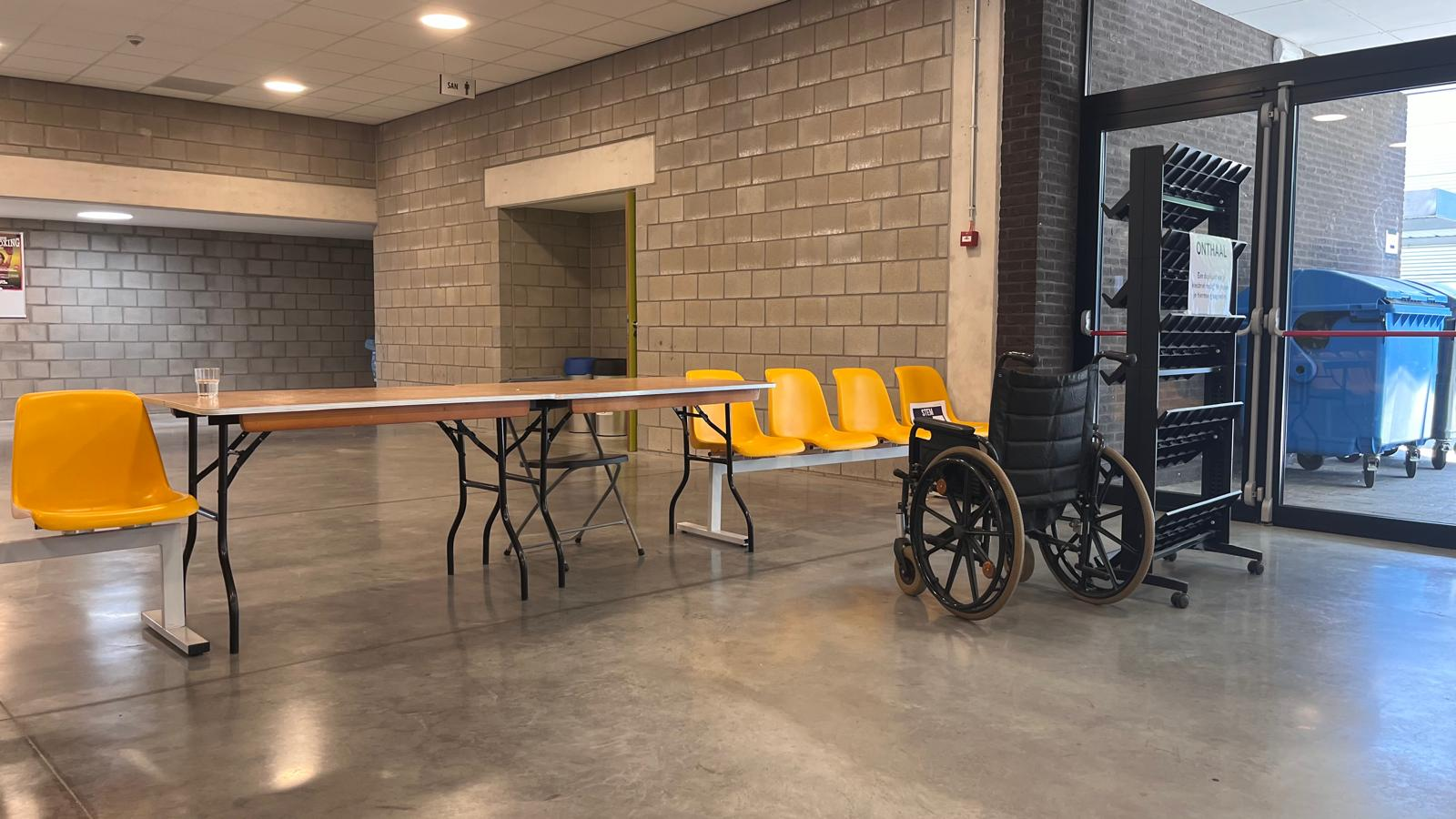
Campaign violence (17:15)
Though today there have been no reports of major incidents so far, the days leading up to the vote have been marked by violence in several European countries.
Especially in Germany, politicians have been under attack, with reports of members of the far-right Alternative for Germany (AfD) attacked in the southwestern city of Karlsruhe on Saturday.
On Thursday, a local candidate for the AfD was stabbed in Mannheim, following assaults on Green and Social Democrat politicians in May.
But attacks occurred elsewhere as well. On Friday, a man assaulted Danish prime minister Mette Frederiksen, who came away mostly unscathed, but cancelled election events afterwards.
However, the most high-profile attack was last month’s assassination attempt on Slovak prime minister Robert Fico, who reportedly is recovering well despite being shot multiple times.
The unprecedented violence is a marker of the highly agitated political atmosphere across the EU, with the expected right-wing surge making the current elections more tense than ever.
Ambience outside the European Parliament (17:10)
As journalists get ready for election night, citizens enjoy sunny Brussels.
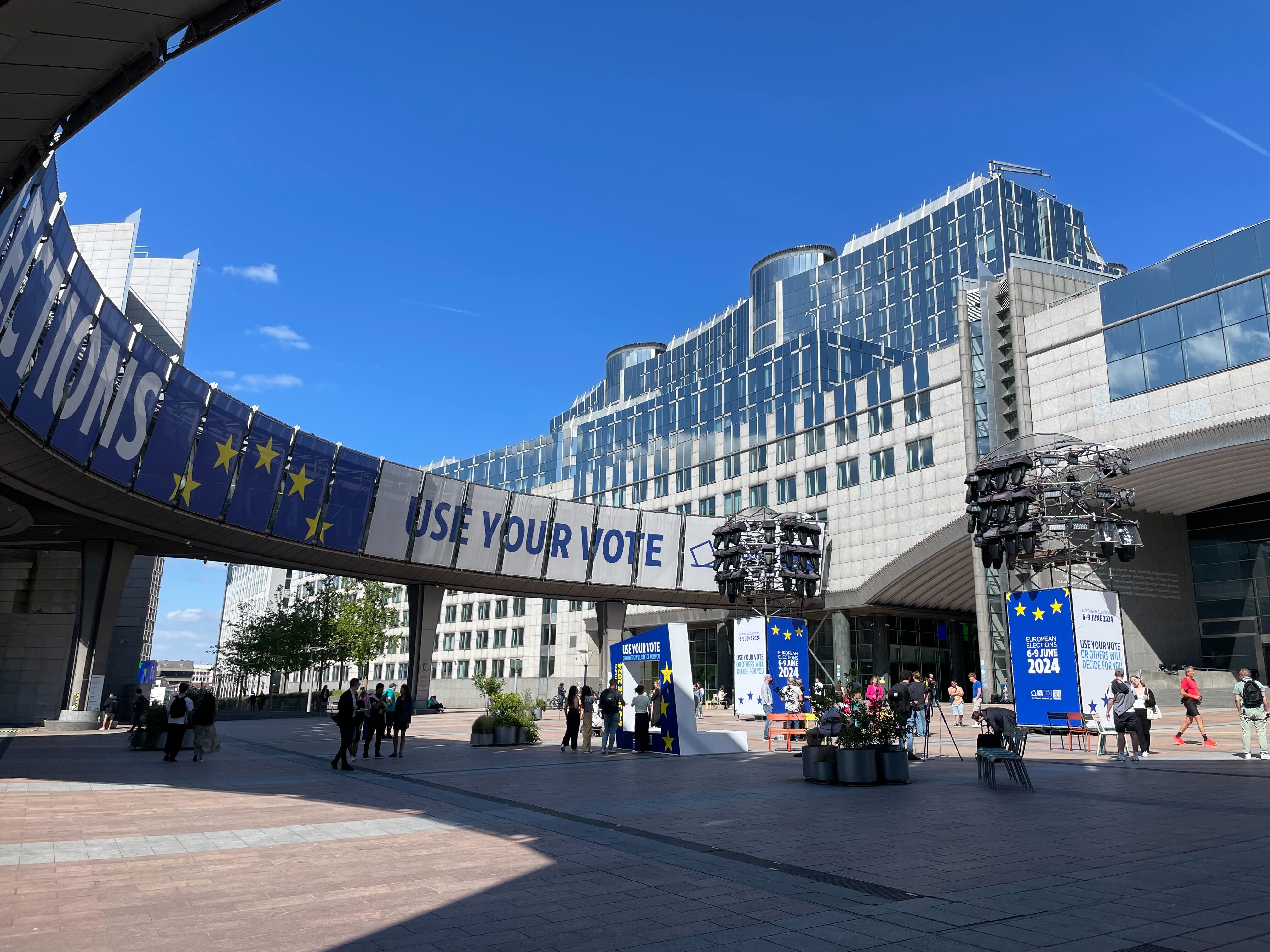
Disinformation concerns (16:22)
Europe has yet to experience any large-scale disinformation campaign, says the European Digital Media Observatory (EDMO).
The EDMO has, however, detected various narratives enticing people not to vote in the days leading up to the vote. The latest includes social media posts in Germany making bogus claims that the EU wants to impose a “Ukraine Solidarity Tax” of 80 euros per month starting August 2024.
An EU official told reporters last week that such campaigns have increased in complexity and sophistication.
“We do see more, a little bit across the board, but I have to be also very clear in quantitative terms, we do not see an explosion of disinformation of information,” he said.
Latest from Pollwatch (16:01)
Dive into the latest insights from our collaborative Pollwatch project, offering updates on evolving political landscapes — alongside potential shifts in upcoming party dynamics.
Turnout figures (15:30)
As the first results come trickling in, turnout is shaping up to be high across Europe, possibly improving upon 2019. Apart from the high turnout in the Netherlands, the first results in Czechia and Latvia suggest an improvement over 2019, with preliminary data from France registering a slight uptick as well.
But in Hungary especially, turnout is shaping up to be impressive: at 1 pm 33 percent of voters showed, a whopping ten percent higher than in 2019.
It remains to be seen who stands to benefit from the stronger participation, however. Whereas results from the Netherlands indicate that pro-European voters had contributed to the higher turnout, it could also stem from more successful mobilisation by the far-right, whose voters historically show up less during European elections.
26 million new voters (12:34)
Many teenagers aged 16 will on Sunday have voted for the first time in Belgium and Germany, (which both lowered their voting age in the last couple of years), as well as Austria, and Malta, where it was already permitted. In Greece, they can do so from the age of 17. It is estimated that a million young voters, aged 16 and 17, will vote for the first time in 2024. As a result, it is estimated that there will be around 26 million eligible first-time voters for these European elections.
What happens after election night? (12:30)
EU member states' authorities will communicate to the European Parliament the names of the elected MEPs in the coming days.
Meanwhile, political groups will rush to rearrange themselves — to split funds and the possible top jobs. By 15 July, political groups will notify the EU parliament president, Roberta Metsola, of their names, their political declaration and their composition. The new mandate of the European Parliament, in its joint homes of Brussels and Strasbourg, will officially start on 16 July.
Insights from the Netherlands, Ireland, Slovakia, the Czech Republic and Latvia (Sunday 12:15)
As we warm up for the election night, citizens in the Netherlands (6 June), Ireland (both on Friday 7 June), the Czech Republic (7-8 June), Slovakia (8 June) and Latvia (8 June) have already voted.
The exit polls in the Netherlands on Thursday night showed that high voter turnout in the Dutch elections was crucial in affecting the outcome, which was more favourable for the pro-EU camp than expected. Though Geert Wilders’ far-right Party for Freedom (PVV) is projected to win seven seats, the Green-socialist coalition party remained on top with eight seats.
Though Ireland conducted no exit polls, simultaneous local elections suggest the liberal Fianna Fáil and the centre-right Christian democrats of Fine Gael performed well, while Greens are projected to slump, winning none of Ireland's 15 seats.
In Slovakia, where the vote took place in the aftermath of the assassination attempt on prime minister Robert Fico, polls stayed open for longer than planned, after a polling station temporarily closed over a white powder scare. According to unofficial results released on Sunday morning, the liberal Progressive Slovakia narrowly beat Fico's Smer.
In the Czech Republic and Latvia, no exit polls were organised. We will have to wait for the first estimates and provisional results later today to know more.
But the opposition Czech ANO party, led by former prime minister Andrej Babis, is leading the polls with a populist stance critical of Brussels. The ruling coalition of prime minister Petr Fiala, known as Together, was polling closely behind the ANO party. The Pirate Party and STAN, part of Fiala's government, are also expected to win seats in the European Parliament.
According to Latvian media, and based on unofficial estimates, the National Alliance (from the European Conservatives and Reformists) and New Unity (European People's Party) are projected to get two seats each. Meanwhile, For Latvia's Development (Renew), the United List (European Conservatives and Reformists), Latvia In First Place (a relatively new right-wing populist party without a specific European affiliation), Harmony (Socialists and Democrats) and the Progressives (Greens) are expected to gain one seat each.
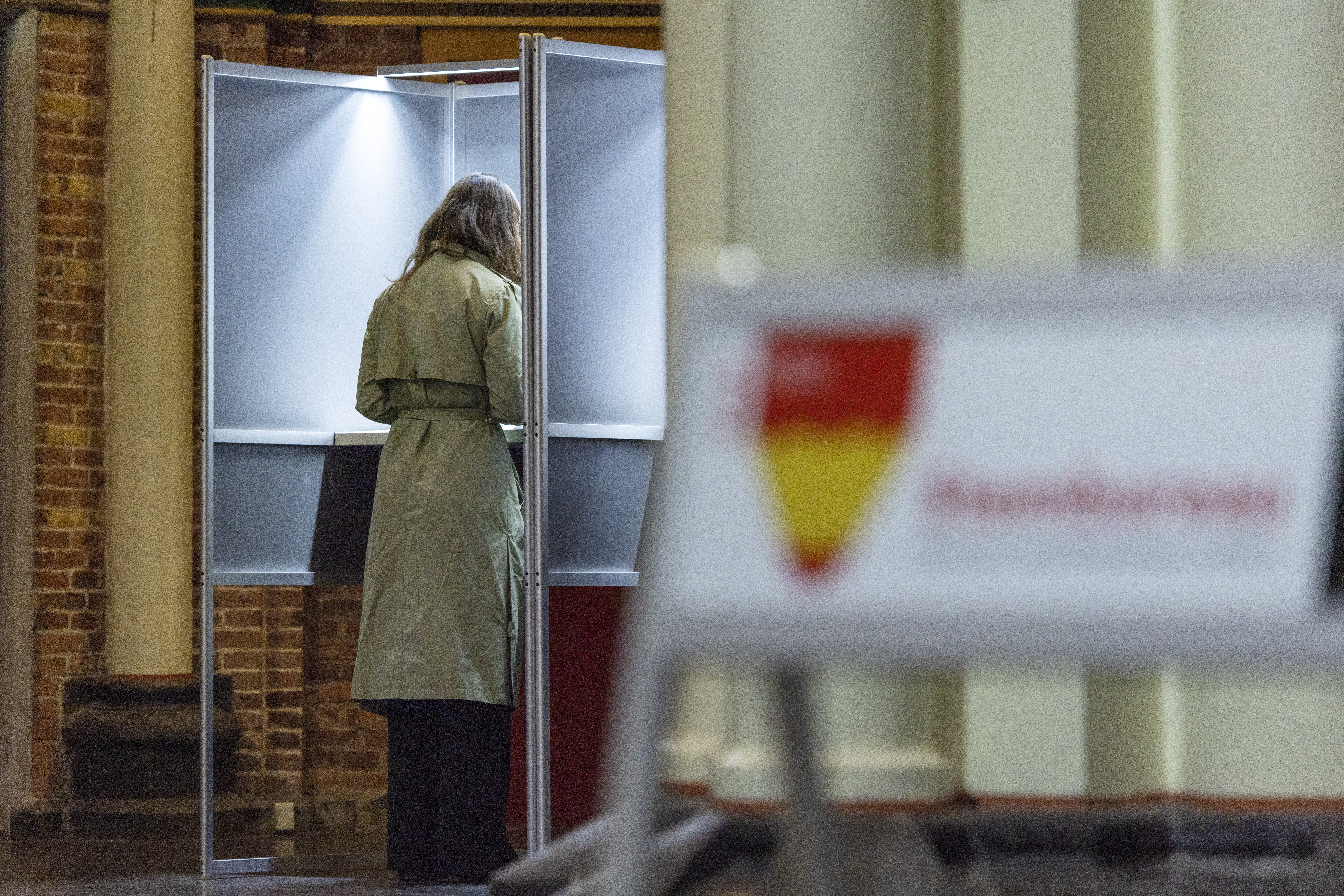
The outgoing European Parliament (11:30)
The last European Parliament originally had 751 seats as the UK was still a member. After Brexit, this number was reduced to 705. 23 out of the 73 seats previously held by UK MEPs were reallocated to EU member states while the remaining 46 seats were kept in reserve for potential future EU enlargements. France, Spain, and the Netherlands each gained two additional seats. Austria, Belgium, Poland, Slovenia, Slovakia, Finland, Latvia, Ireland, and Denmark each gained one additional seat. As a result, the number of MEPs elected in 2024 will be 720.
